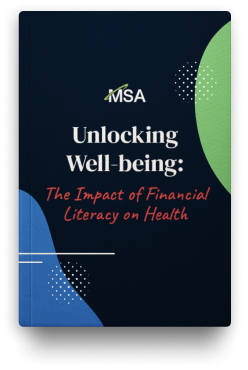Unlocking Well-being: The Impact of Financial Literacy on Health
Discover how overall health and well-being are transformed when employees seek educational guidance through the employee financial well-being solution, My Secure Advantage®.

“With growing stress and health concerns, employees can’t navigate personal finance issues alone any longer.”
Financial problems are one of the top stressors for employees across different generations and demographics. These problems are exacerbated by the stigmas surrounding money issues, leading employees to feel ashamed, embarrassed, and less likely to seek help. This isolation causes stress and negative health impacts to skyrocket.
As can be seen in our analysis, there is a clear correlation between health and personal finance issues, and the solution lies in a highly personalized, holistic financial well-being program – like MSA’s – that augments human connection with advanced technology and education. With us, employees can create strategies and build skills that directly address their financial issues and guarantee long-lasting results and peace of mind.
In this eBook, you can discover:
- In-depth insights from surveyed employees that show financial stress is highly correlated with health concerns
- How productivity, engagement, and satisfaction rates have been negatively impacted by financial stress
- How transformation happens almost immediately once an employee starts working with a Money Coach and consistently uses MSA’s solution
…and much more!
For the full report, access our eBook here.
More Like This
Important implications for employers regarding the Federal Reserve’s study on the financial well-being of U.S. households
Growing financial stress could cause irreparable damage to the overall well-being of employees. Dive deeper into some trending data concerning employees' mental and financial health and see how MSA is helping employees reduce their financial stress.
50% of employees with health insurance had higher healthcare expenses this past year, according to EBN magazine.1 What’s more is the higher costs are pushing employees to make poor financial decisions that not only prove harmful for their current situation but for their future as well. With employees’ financial and general well-being in question – […]
Can a financial wellness program yield an ROI that is meaningful to your company? The financial health of your employees directly affects their well-being, and in turn, the ways they work. According to a report published by the FINRA foundation, 60% of Americans feel anxious about their personal finances. This means that money is often […]
Extras


